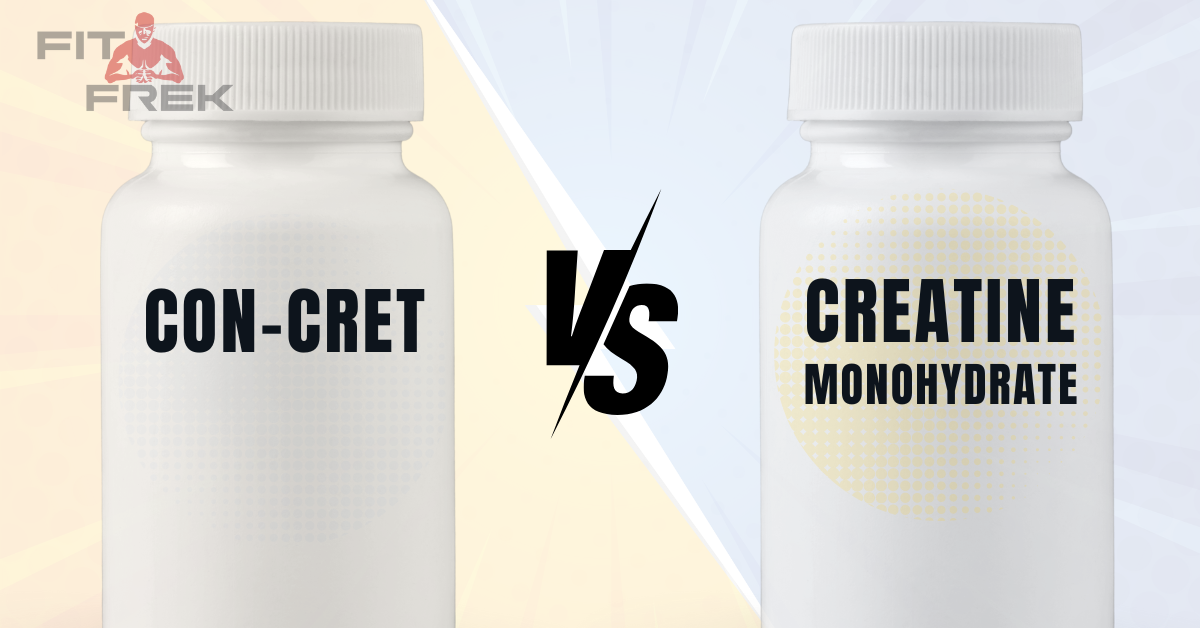
Creatine is a popular supplement for enhancing performance and promoting muscle growth.
Two forms of creatine that are commonly used are Con-Cret Creatine (Creatine Hydrochloride) and Creatine Monohydrate.
This article will compare these two forms of creatine, examining their ingredients, effects, and the science behind them.
Con-Cret Creatine, manufactured by ProMera Sports, is a form of creatine known as hydrochloride (HCL).
It is marketed as a concentrated form of creatine that offers superior absorption, potency, and bioavailability compared to other forms.
On the other hand, Creatine Monohydrate is the most researched form of creatine and is widely recognized in the scientific community for its proven safety and efficacy.
It is used by many athletes, from bodybuilders to endurance athletes, to enhance performance and muscle growth.

ProMera Sports, the company behind Con-Cret Creatine, is a sports nutrition company focusing on developing innovative, high-quality supplements to help athletes and fitness enthusiasts achieve their goals.
On the other hand, Creatine Monohydrate is produced and sold by various supplement companies, making it widely available and accessible.
The primary ingredient in Con-Cret Creatine is creatine hydrochloride.
This form of creatine is claimed to have superior solubility and absorption compared to other forms of creatine, which may result in less bloating and gastrointestinal discomfort.
Read: Best Creatine HCL Supplements
Creatine Monohydrate contains one molecule of water for each molecule of creatine, hence the name 'monohydrate.'
It is the most extensively studied and clinically effective form of creatine for improving athletic performance.
Con-Cret Creatine and Creatine Monohydrate are designed to enhance performance, increase strength, and promote muscle growth by increasing the body's phosphocreatine stores, a form of stored energy in the cells.
They both work by increasing the availability of ATP (adenosine triphosphate), the body's primary energy source for short, intense bursts of power.
Both Con-Cret Creatine and Creatine Monohydrate aim to deliver the benefits of creatine supplementation, including increased strength, improved performance, and enhanced muscle growth.
They both achieve this by increasing the body's phosphocreatine stores, a form of stored energy in the cells, which helps produce more of a high-energy molecule called ATP (adenosine triphosphate).
The key difference lies in the form of creatine used. Con-Cret Creatine uses creatine HCL, which is claimed to have superior solubility and absorption.
Creatine Monohydrate, however, uses the monohydrate form, the most studied and widely accepted form of creatine.
Creatine works by increasing the availability of ATP (adenosine triphosphate), the body's primary energy source for short, intense bursts of power.
This particularly benefits high-intensity, explosive exercises such as weightlifting or sprinting.
When it comes to the effectiveness of Con-Cret Creatine vs Creatine Monohydrate, it's important to note that while both forms of creatine can increase the body's stores of phosphocreatine, the extensive research on creatine monohydrate and its proven effectiveness gives it an edge.
For example, a study published in the Journal of International Society of Sports Nutrition found that creatine monohydrate supplementation significantly increased lean tissue mass and improved body composition.
On the other hand, while creatine hydrochloride is claimed to have superior solubility and absorption, there is currently less research to support these claims.
More research is needed to fully understand the potential benefits and effectiveness of creatine hydrochloride compared to creatine monohydrate.

When comparing Con-Cret Creatine and Creatine Monohydrate, it's important to consider the key differences and similarities.
Both supplements are designed to enhance performance and promote muscle growth but differ in their creatine form and solubility.
Con-Cret Creatine, with its creatine HCL, is claimed to be more soluble than creatine monohydrate.
This means it may be more easily absorbed by the body, potentially leading to greater effects with a smaller dose.
However, it's worth noting that while creatine HCL has shown promise in preliminary studies, it hasn't been studied as extensively as creatine monohydrate.
On the other hand, Creatine Monohydrate is backed by decades of research.
Numerous studies have confirmed its benefits for enhancing performance, increasing strength, and promoting muscle growth.
While it may not be as soluble as creatine HCL, its efficacy is well-established in the scientific community.
Creatine, in its HCL and monohydrate forms, increases the body's phosphocreatine stores.
This increase aids the production of ATP, the body's primary energy source.
During high-intensity exercise, ATP is broken down to produce energy.
The increased availability of ATP can result in improved performance and enhanced muscle growth.
Creatine HCL, used in Con-Cret Creatine, is claimed to have better solubility and absorption than other forms of creatine.
However, while preliminary studies show promise, more research is needed to confirm these claims.
Creatine Monohydrate, on the other hand, is backed by extensive research.
Numerous studies have confirmed its benefits for enhancing performance, increasing strength, and promoting muscle growth.
For example, a meta-analysis of over 100 studies found that creatine monohydrate supplementation led to a 5-15% improvement in strength and performance.
In terms of research, Creatine Monohydrate is the clear winner.
It's the most studied form of creatine, with hundreds of studies confirming its benefits for strength, performance, and muscle growth.
While Con-Cret's creatine HCL shows promise, it hasn't been studied as extensively.
Both supplements can enhance strength as they increase the body's stores of phosphocreatine, aiding in the production of ATP.
However, given the extensive research backing creatine monohydrate, it's the more reliable for strength gains.
Again, both supplements can promote muscle growth by increasing the body's phosphocreatine stores.
However, the extensive research on creatine monohydrate and its proven effectiveness give it an edge.
For example, a study published in the Journal of International Society of Sports Nutrition found that creatine monohydrate supplementation significantly increased lean tissue mass and improved body composition.
While both Con-Cret Creatine and Creatine Monohydrate can enhance performance and promote muscle growth, the extensive research backing creatine monohydrate makes it the more reliable.
However, individuals who experience stomach discomfort with creatine monohydrate may find Con-Cret Creatine a suitable alternative due to its superior solubility and absorption.

Is creatine safe?
Yes, creatine is considered safe for healthy individuals when used at recommended doses.
Can I take Con-Cret Creatine and Creatine Monohydrate together?
It's not recommended to take two forms of creatine together. It's best to stick with one form.
Do I need to cycle creatine?
No, creatine does not need to be cycled.
Can creatine help me lose weight?
Creatine can help increase muscle mass, and more muscle can help burn more calories and potentially aid in weight loss.
Does creatine cause water retention?
Creatine can cause water retention in the muscles, leading to a slight increase in body weight.
Can I take creatine without working out?
While creatine can provide benefits without working out, its effects are much more pronounced when combined with resistance training.
Does creatine cause hair loss?
There's no conclusive evidence to suggest that creatine causes hair loss. A study found a link between creatine and increased DHT (an androgen that can contribute to hair loss), but more research is needed.
How much creatine should I take?
The recommended dose for creatine monohydrate is 5 grams per day. For Con-Cret Creatine, follow the dosing instructions on the product label.
When should I take creatine?
Creatine can be taken at any time of the day, but some people prefer to take it before or after a workout.
Can I take creatine on an empty stomach?
Yes, but some people may experience stomach discomfort when taking creatine on an empty stomach.
Both Con-Cret Creatine and Creatine Monohydrate enhance performance and promote muscle growth.
While Con-Cret Creatine's creatine HCL is claimed to have superior solubility and absorption, the extensive research backing creatine monohydrate makes it the more reliable choice for most people.
It's important to consider your individual needs, preferences, and tolerance when choosing a supplement.
Useful Links
 About FitFrek
About FitFrekFitFrek operates as an independent platform, offering comprehensive workouts, programs, routines, guides, and unbiased reviews to accelerate your progress. We pride ourselves on our honesty, delivering straightforward and candid insights. FitFrek does not offer medical advice, diagnosis, or treatment services.